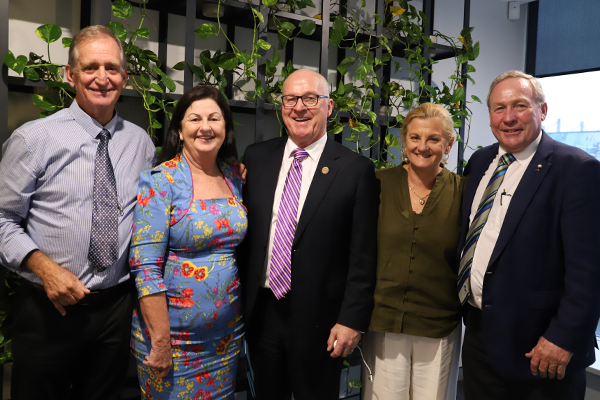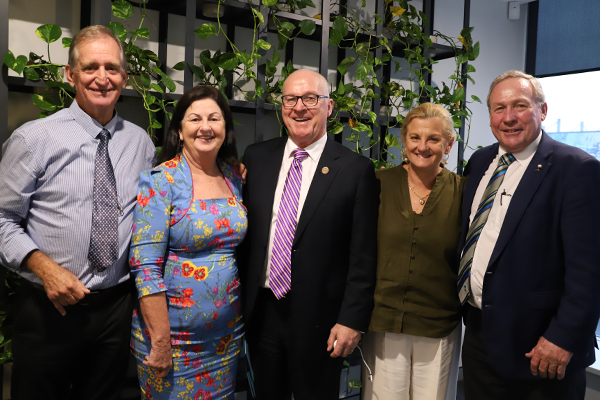‘It’s teamwork’: Outgoing mayors reflect on their terms and welcome ne
Published on 04 April 2024

As fresh faces fill council chambers throughout Queensland, five retiring mayors—and members of the LGAQ Policy Executive—share the highs and lows of the top job and what they wish they had known before they donned the robes and chains for the first time.
A local government election brings with it inevitable changes for many councils as existing elected members move on—whether by choice or by vote—and new councillors and mayors take their places.

These changes are also felt here at the LGAQ. Before a single vote was cast, we knew that almost a third of the LGAQ Policy Executive—the 15 district representatives (and LGAQ President) responsible for determining the Association's policy on behalf of member councils—would be moving on.
In the lead up to the elections, we sat down with LGAQ President and Sunshine Coast Mayor Mark Jamieson and Mayors Karen Williams (Redland City Council), Paul McVeigh (Western Downs Regional Council), Anne Baker (Isaac Regional Council) and Peter Scott (Cook Shire Council) to mine their collective wisdom for the benefit of all new and returning members. And with more than 75 years of local government—and 30 years of LGAQ Policy Executive—experience collectively, the advice is valuable.
This is what they had to say.
Can you tell us how the LGAQ has helped you and your council in your time in office?
Mark: I want to thank my councillors at the Sunshine Coast Council for recognising and supporting me because there's a fair bit of time consumed by being the President of the LGAQ, so to have your councillors supportive of that is important. The LGAQ is a great organisation, represents councils on various issues [and is] very strong in advocacy.
Karen: There's too many, I guess, opportunities that have come our way that LGAQ presented to us, and we couldn't have done it if the sector didn't get behind it. Everything from, you know, the electoral system through to the OIA, [where] it really needed a group of people to stand up together and the LGAQ can bring those people together—and has been successful in doing that.
Paul: The LGAQ has just been an outstanding organisation. You see the benefits that go to all councils…and whether it’s a small issue or very, very much a hard issue, the LGAQ has the capacity and can deliver for our communities.
Anne: I’ve been in local government for 17 years—the last 12 of those years I've been the Mayor of Isaac Regional Council—and the LGAQ has been absolutely integral. Specifically, the advocacy—the way that they structure and have moved forward and worked with the individual councils—is just extraordinary. The support for communities and social aspects of all of our communities—it's a credit to the LGAQ.
Peter: If you're remote…it's difficult to get in and make your advocacy, make your representations at state and federal levels because of distance and cost—a lot of us are financially stressed councils too. A lot of our councils we represent as mayors and councillors only have a small population base so, from a political perspective, we haven't got a lot of votes out there to twist a politician’s arm with. The LGAQ talks on our behalf, takes our issues over and represents us all. I think that's a real value.
What motivated you to nominate for local government in the first place?
Mark: I saw fantastic potential in the Sunshine Coast, but I thought the opportunities weren't really being developed, and I saw being mayor as an opportunity to correct that. You can sit on the sidelines and whinge about it, or you can put your hand up, get elected and get on with it. And that's certainly what I've tried to do.
Karen: Having grown up in Redlands and knowing that our young people were leaving the city—they were becoming our biggest export—I thought we needed to paint a picture that provided them the opportunity to live there and to work there. I’d been a councillor for eight years so I kind of really understood, you know, the machinations of what it takes to move the whole city and council forward and that was my motivation—to make it a better place than when I first found it.
Paul: I suppose I’d never really thought about going into local government, and then-Mayor Ray Brown tapped me on the shoulder, said, “Paul, you should step up and have a go at being Mayor of our region”. I thought about it a bit and made my decision to stand—I'd been very much involved in our community at a lot of different levels—so I put my hand up to have a crack and I was very, very lucky to be elected Mayor in 2016.
Anne: I was a councillor for a short term prior to amalgamation in 2008. I then went into the amalgamated council as a councillor, which was probably—I'd have to say on reflection—the most challenging term I've had. What I did establish in my own mind by the end of that term though, [was] that if I wanted to be on the ship, I certainly wanted to be the captain.
Peter: I've always been a community-orientated person. I didn't know a thing about the nitty-gritties or the nuts and bolts of local government, but my community basically said, ‘you should put your hand up to run for council’, so I did in 2004 and I got elected for my first term as councillor and then the subsequent four terms as mayor. It has been a huge privilege and a massive learning curve—and a lot of fun as well.
What has been the biggest challenge you've faced in your time in local government?
Mark: Challenges are challenges—whether they're internal challenges or external challenges, whether they're things that are changing the world or things that are just changing this particular suburb, you need to be mindful of that. You know, lifestyle is very important to people who come to live on the Sunshine Coast. And that's why, in many ways, people are prepared to give up a decent salary for living in a place of paradise. But I was able to convince them that you can have both.
Karen: There are a lot of challenges. Most people actually don't understand the role of local government, nor do they understand the role of being a mayor. They think that we are basically able to make autocratic decisions and that everything that should be done should be a decision of the mayor or everything that goes wrong is the mayor's fault. And of course we’re just—in my case—one of 11 votes. So you have to build the team to support what your vision is, and sometimes that's really difficult.
Paul: [Disaster] has probably been the biggest one across the whole region, whether it’s been, unfortunately, those devastating shootings that took some much-loved ones away from their families and obviously their occupations, but then there's the fires and the floods.
Anne: The challenges with our roads, all of our infrastructure, the points of difference from all different communities. [Councils’] actual challenges are very alike, but it's not a one-size-fits-all—what works in our region doesn't necessarily work in other regions. The challenge is to try and get good policy position, good plans that will that work for everybody. Round pegs in round holes are what we need.
Peter: Cook Shire is the biggest land shire in Queensland but we've only got about 5,500 people in the whole shire, so actually getting out and having an influence across the shire is pretty difficult without support. Unfortunately, we've [also] got disasters. This latest one, Cyclone Jasper, has been horrendous—absolutely unprecedented—with the degree of environmental, infrastructural and social damage that's been done.
What would you say has been your greatest achievement?
Mark: I made an undertaking in our Regional Economic Development Strategy that the household incomes of Sunshine Coast residents—at that time, 22 per cent below the state average—to be on par with the average household income in the state. At the last census we were four-and-a-half per cent below the state average and I would think by now we are probably on the state average. People can now be confident of raising their kids, sending them to school [and] maybe to university knowing that they'll be able to get good-paying jobs on the Sunshine Coast.
Karen: From an economic development point of view, there's over $6 billion worth of projects in the pipeline that celebrate our position on Morton Bay. On the domestic and family violence front, we've been very much a vocal participant in raising awareness…raising funds [and] assisting with providing extra housing for impacted families of domestic and family violence.
Paul: It’s really having a very united council—I’m very, very proud that we do work really well together. We do debate well, but as a council we make those decisions and we stand by each other on those decisions—and we've had some tough decisions to make, as every other councillor would have experienced. I suppose the highlight [is] seeing an organisation working so well to build and deliver for the future of our community.
Anne: There are two really big pieces of work that I led with my council, and that was two legislative changes. The first one being with the Sustainable Resource legislation and most recently, last year was the Glenden legislation, which literally is legislation to save the life of a community. They would have to be two of the biggest…but I think to be really honest and frank, it’s just being able to sustain the time to sit in the mayor’s role for 12 years, having a commitment and consistent support from my elected councillors and from our community.
Peter: My wife and I turned up [in Cooktown] 30 years ago and it was a funny little place—the road was awful, we had maybe two air flights a week and one school. Now we've got three schools, we've got a beautiful, sealed road all the way from Cairns to Cooktown. We've got four flights a day coming in and out and the future is looking very bright for Cooktown.
What piece of advice would you give to a newly elected councillor or mayor?
Mark: I think the success of any council is about working as a team, whether you've got five team members or 13 team members or 50 team members, you have to be prepared to sit down and determine what you agree on…and get them in place.
Karen: Surround yourself with good people—take advice from those who may not have an agenda but have an open mind as to where you're going to head in the first instance. Don't make rash decisions, because it's a big learning curve for someone that hasn't been in local government before. Use the resources that are available to [you]—the LGAQ, I mean, they're at the end of the phone.
Paul: It is about working together [and] being united. In a very united council, you have the capacity to deliver how you feel…and know you're not going to get challenged in making some strong statements because it's a united council.
Anne: Stay true to yourself, don't overcommit and under-deliver. Particularly, don't overcommit before you understand the operations of council business. I think one of the biggest things in council is understanding and working out how to work as a team.
Peter: If you’re privileged to get in, then you've got to think about the team that you're working with. You can't do anything on your own. I've always said that the most valuable resource that a mayor has are his staff and his councillors. You've got to be working together because if you don't, it won't work.